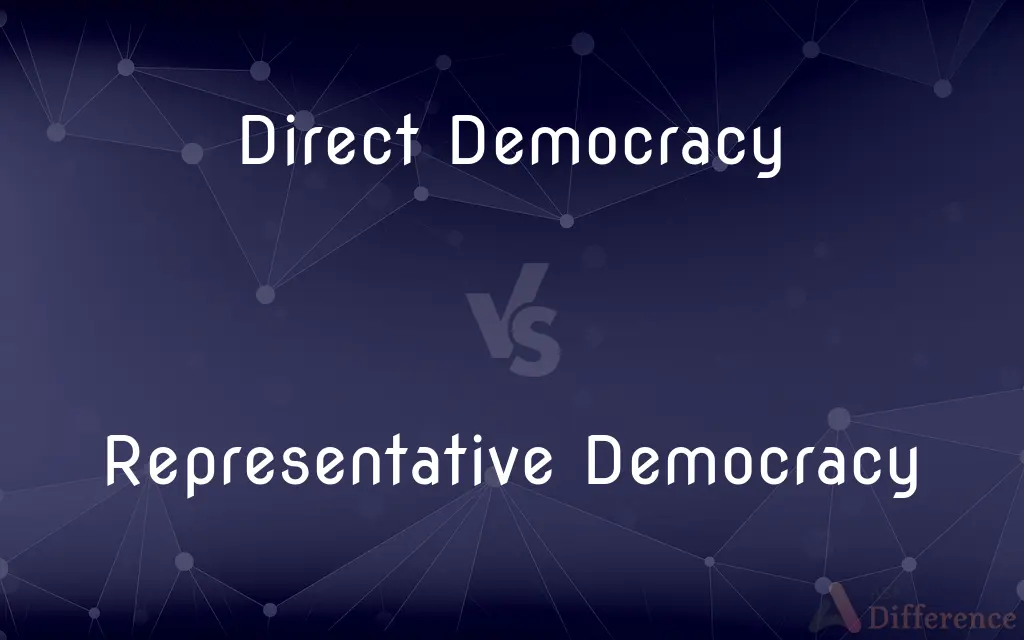Direct Democracy vs. Representative Democracy — What's the Difference?
By Tayyaba Rehman & Fiza Rafique — Published on February 26, 2024
Direct Democracy involves citizens voting on laws and policies directly, while Representative Democracy elects officials to make decisions on their behalf.

Difference Between Direct Democracy and Representative Democracy
Table of Contents
ADVERTISEMENT
Key Differences
In Direct Democracy, every citizen has the opportunity to vote on legislative matters, offering a hands-on approach to governance. This system allows for direct participation but can be impractical in large populations due to the complexity and volume of decisions required.
Representative Democracy, on the other hand, involves the election of representatives who make decisions for the populace. This method streamlines decision-making and is suited to larger societies, but it can create a disconnect between the electorate and policymakers.
Direct Democracies thrive in smaller communities or organizations where the logistical challenges of gathering votes on numerous issues are manageable. This immediacy in decision-making ensures that the citizens' voices are directly heard in the legislative process.
Representative Democracies utilize a structured electoral system to choose leaders, theoretically ensuring that those elected are qualified to make informed decisions. However, this can lead to issues of accountability and representation if elected officials do not act in their constituents' best interests.
Direct Democracy offers a more participatory approach to governance, whereas it may struggle with efficiency and scalability. Representative Democracy, conversely, provides a more manageable framework for large-scale governance but may dilute individual influence.
ADVERTISEMENT
Comparison Chart
Decision-making
By the populace on individual issues
By elected officials on behalf of the populace
Scale
More effective in smaller communities
Suitable for larger populations
Participation
High, every citizen is directly involved
Indirect, through elected representatives
Efficiency
Lower due to widespread participation
Higher, due to a more streamlined process
Representative Selection
Not applicable, as there are no representatives
Citizens elect representatives to make decisions
Compare with Definitions
Direct Democracy
Prone to challenges in large populations.
The national referendum showed the challenges of implementing direct democracy on a large scale.
Representative Democracy
It can suffer from issues of accountability and representation.
The protest highlighted the perceived disconnect between elected officials and the public in our representative democracy.
Direct Democracy
Direct Democracy emphasizes the direct participation of individuals in decision-making.
The town hall meeting embodied direct democracy, allowing everyone to voice their opinions on the new park.
Representative Democracy
Suited for managing the complexities of large, diverse populations.
The federal system of governance exemplifies representative democracy, managing the diverse needs of millions.
Direct Democracy
It eliminates the need for elected legislative representatives.
In a direct democracy, there would be no senators, only regular citizens making legislative decisions.
Representative Democracy
It allows for specialization and delegation in decision-making.
Voters chose a seasoned economist as their representative, trusting his expertise in financial matters.
Direct Democracy
Can lead to a more engaged citizenry.
Direct democracy encouraged more people in the community to educate themselves on the issues at hand.
Representative Democracy
Representative Democracy is characterized by periodic elections.
The upcoming elections are a crucial aspect of our representative democracy, determining our leaders for the next four years.
Direct Democracy
A form of democracy where citizens vote on laws and policies directly.
In a direct democracy, a city's residents could directly vote on whether to increase local taxes.
Representative Democracy
A democratic system where citizens elect representatives to make decisions on their behalf.
In our representative democracy, we vote for congress members to represent our interests.
Common Curiosities
What is Direct Democracy?
Direct Democracy is a form of democracy where citizens have direct participation in the decision-making process, typically through voting on laws and policies.
How do citizens participate in a Direct Democracy?
Citizens participate by voting directly on laws, policies, and other important decisions, rather than through elected representatives.
What are the main benefits of Representative Democracy?
Representative Democracy streamlines decision-making, allowing for a more manageable governance structure in large societies and enabling specialization among elected officials.
What are the challenges of Direct Democracy?
Direct Democracy can be time-consuming, less efficient, and difficult to manage with large numbers of participants and complex issues.
Can a large nation implement Direct Democracy for local decisions?
Yes, some large nations implement Direct Democracy at local levels or for specific decisions through referendums and initiatives.
What role do political parties play in Representative Democracies?
Political parties often play a significant role in organizing candidates, shaping policies, and mobilizing voters.
Does Direct Democracy ensure better alignment with public opinion?
Direct Democracy can more closely align with public opinion on specific issues, as decisions are made directly by the populace.
Can Direct Democracy work in large countries?
Direct Democracy is challenging to implement on a large scale due to logistical issues and the complexity of managing numerous decisions with a vast population.
Is Representative Democracy less democratic than Direct Democracy?
Not necessarily; while Representative Democracy involves indirect participation, it still upholds democratic principles through elections and accountability mechanisms.
How do representatives get chosen in a Representative Democracy?
Representatives are typically chosen through elections, where citizens vote for candidates who they believe will best represent their interests.
How are conflicts resolved in a Direct Democracy?
Conflicts in Direct Democracy are often resolved through debate, discussion, and subsequent voting to reach a majority decision.
How does Representative Democracy work?
In Representative Democracy, citizens elect officials to represent their interests and make decisions on their behalf in the legislative process.
What mechanisms ensure accountability in Representative Democracies?
Mechanisms like elections, checks and balances, and legal frameworks help ensure accountability in Representative Democracies.
How do citizens ensure their representatives act in their interest?
Citizens can hold their representatives accountable through feedback, participation in elections, and engaging in civic activities like petitions and public forums.
Can technology enhance Direct Democracy in large populations?
Yes, technology, especially digital platforms, can facilitate Direct Democracy by enabling online voting and information dissemination.
Share Your Discovery

Previous Comparison
Rafael Nadal vs. Roger Federer
Next Comparison
Usage vs. ConsumptionAuthor Spotlight
Written by
Tayyaba RehmanTayyaba Rehman is a distinguished writer, currently serving as a primary contributor to askdifference.com. As a researcher in semantics and etymology, Tayyaba's passion for the complexity of languages and their distinctions has found a perfect home on the platform. Tayyaba delves into the intricacies of language, distinguishing between commonly confused words and phrases, thereby providing clarity for readers worldwide.
Co-written by
Fiza RafiqueFiza Rafique is a skilled content writer at AskDifference.com, where she meticulously refines and enhances written pieces. Drawing from her vast editorial expertise, Fiza ensures clarity, accuracy, and precision in every article. Passionate about language, she continually seeks to elevate the quality of content for readers worldwide.
















































